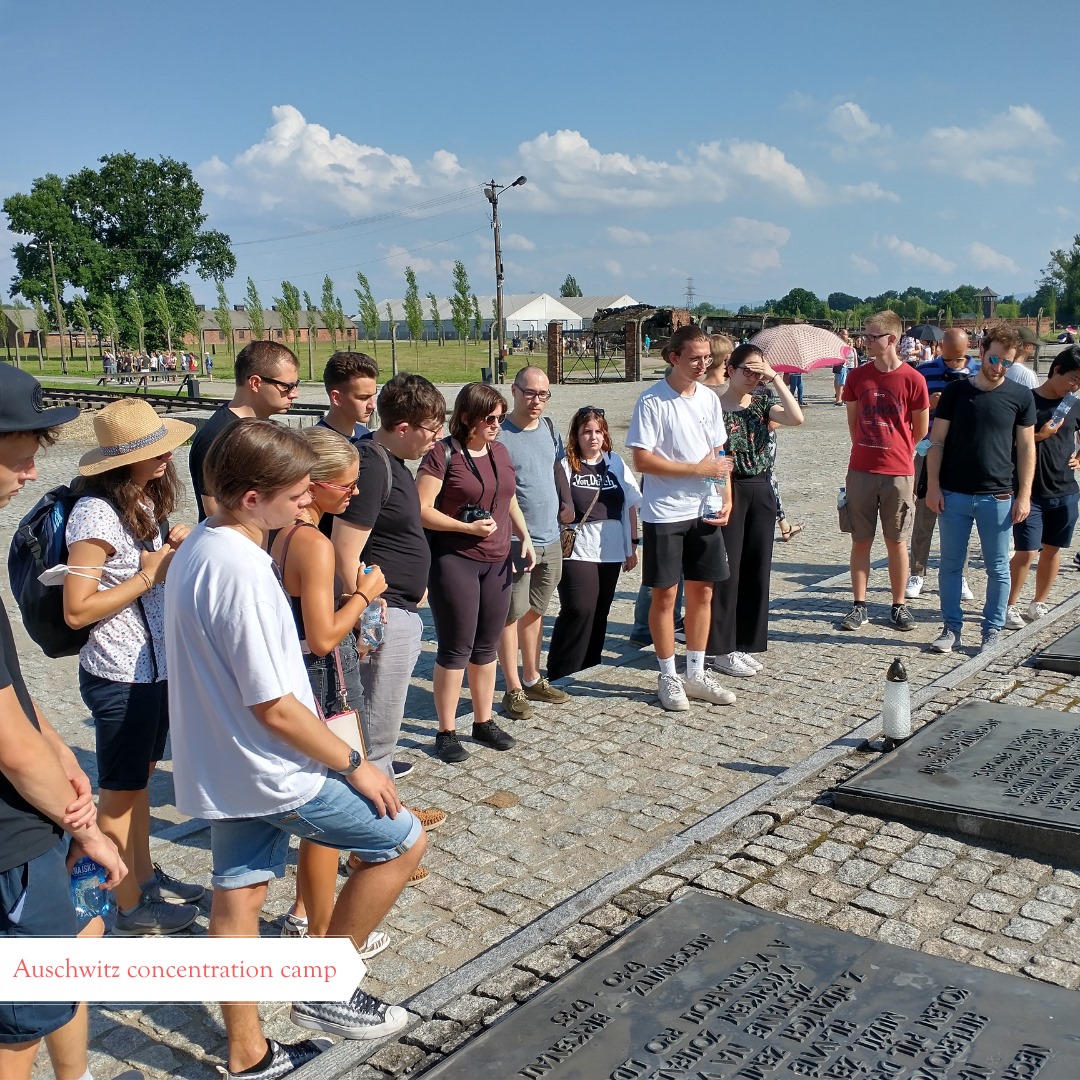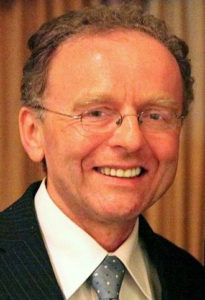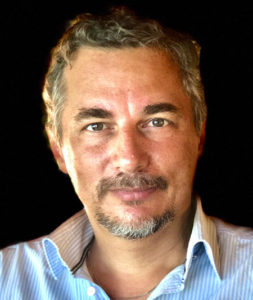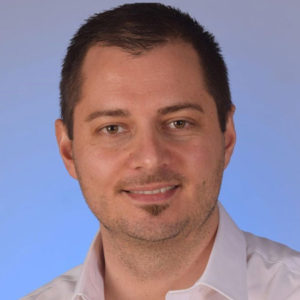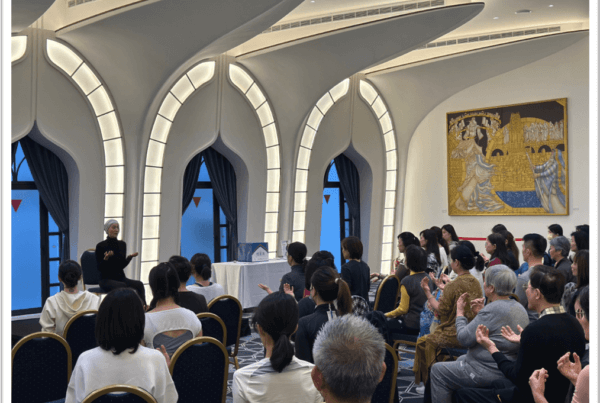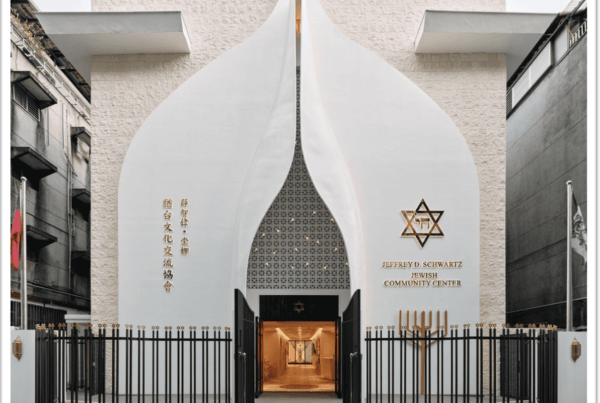The first time Andreas Maislinger stepped foot as a young student on the grounds of Auschwitz, the largest of the network of Nazi-run concentration camps where over 1 million Jews perished, his life was permanently transformed.
Confronting the horrors of the Holocaust first-hand, Maislinger was forced to think hard about the responsibility that his forebears shared in committing these crimes. He felt he could no longer simply observe and remember the horrors that many of his compatriots were complicit in. He felt compelled to take action.
A friendship Maislinger struck up with Simon Wiesenthal, the renowned Jewish-Austrian Holocaust survivor and Nazi hunter, deepened his understanding of the full extent of Austrian participation in the Holocaust. Their conversations instilled a desire in Maislinger to seek redress for his nation’s role in the genocide, a mission that Wiesenthal committed his life toward fulfilling through his relentless pursuit of the Holocaust’s perpetrators and their enablers.
His idea? Send Austrian youth to visit concentration camps so they could gain the kind of first-hand experience that he had. Dispatch them to Yad Vashem in Israel and other Holocaust education centers to study its horrors and take its lessons back home. Fly them to Jewish community centers to learn about Judaism and Jewish life.
To implement his vision, Maislinger had to lobby the government for their support, a task complicated by their reluctance at the time to recognize Austria’s active role in the Holocaust. Persistence and creativity eventually paid off, however. Maislinger, with the formal support of the Austrian government, developed an alternative program for youth who decided to opt out of the country’s mandatory military service. In 1991, this option was finally enshrined in the country’s laws, providing the legal basis for the establishment of the Gedenkdienst program.
 During the first few years of the program, they sent a handful of young students to Holocaust education centers and Jewish community centers in Europe and Israel. Over time, as the program grew, students ventured further abroad, spending time in the US, and eventually Asia. In the 30 years since its inception, Austrian Service Abroad has evolved into a globally recognized program that receives the financial backing of the Austrian government, and the support of a growing swathe of Austrian society.
During the first few years of the program, they sent a handful of young students to Holocaust education centers and Jewish community centers in Europe and Israel. Over time, as the program grew, students ventured further abroad, spending time in the US, and eventually Asia. In the 30 years since its inception, Austrian Service Abroad has evolved into a globally recognized program that receives the financial backing of the Austrian government, and the support of a growing swathe of Austrian society.
Over the past year, in spite of travel restrictions imposed by many countries as the pandemic raged on, more than 100 young Austrians joined ASA-sponsored programs, spending time volunteering at Holocaust education centers and Jewish community centers across the world. And, in 2022, ASA will send its first student volunteers to the Jeffrey D. Schwartz Jewish Community Center in Taipei, where they will learn about Judaism and Jewish life in Taiwan.
I recently spoke via Zoom with Dr. Maislinger about how he founded Austrian Service Abroad. He was joined by Michael Procházka, Vice Chairman of ASA and a diplomat of the European Union currently posted in New Guinea. Daniel Schuster, Head of the Office for International Affairs in ASA’s Vienna headquarters, and a former student ambassador with the program, joined the conversation. The following is a transcript of our conversation, edited for length and clarity:
Glenn Leibowitz: Dr. Maislinger, the idea of sending Austrian youth volunteers to promote Holocaust awareness was your brainchild. What motivated you to dedicate your life to this work?
Andreas Maislinger: It started in my childhood. I was born in a small village near the German border, just between the towns of Salzburg and Braunau. In answer to the question I once received during my time as a visiting professor in the US, “Where do you come from?”, I replied, “I was born between Mozart and Hitler.” My town was located just between Salzburg, Mozart’s birthplace, and Braunau, where Hitler was born.
When I was a young boy, my father told me that he had to serve in a foreign army. I understood what had happened during the Second World War; I understood that my father, an Austrian and a Catholic, had to join the army of another country, Germany, a country that had occupied Austria. He had to fight in a war that was not his war. I realized this when I was only six or seven years old.
Later, when I went to study in gymnasium in Salzburg, I learned that many Austrians, not just my father, had to serve in the German army. My father was not a National Socialist [Nazi]. But many Austrians supported the war; they supported the crimes committed during the Holocaust.
When I was a university student in Vienna, I became friends with a very famous person named Simon Wiesenthal. I learned a lot from him and his mission to hunt the National Socialist criminals. Through our several conversations, I realized that many Austrians, wearing German uniforms, took part in these crimes, the biggest crimes of the 20th century.
At the time, I was engaged in a student organization. One day, we received a letter covered with huge stamps that was sent from two Polish students. I later visited these two female students who lived very close to a small Polish town called “Oświęcim.” While nobody knows what Oświęcim means, the German name is well known all over the world, unfortunately: Auschwitz. I went there in 1975. I didn’t go just to Auschwitz Stammlagger, Auschwitz Camp 1; I also went to Auschwitz Birkenau, a huge area. I realized then what had happened there.
And from this time, in my head was fixed the idea that I would like to do my alternative military service exactly in this place, because I felt responsible as an Austrian. So many Austrians took part in these crimes. Commanders of three of the extermination camps were of Austrian origin, I later learned from Simon Wiesenthal. It took years after this initial visit to finally establish my program, but this was how it started.
Glenn Leibowitz: How did you finally get the organization off the ground?
Andreas Maislinger: In 1975, Austrian law changed, making it legal to refuse to serve in the army as a conscientious objector. If you refused to join the army, the alternative form of service typically offered to youth at the time was to work for the Red Cross, or for a social institution in Austria. I thought to myself, ‘Yes, it’s okay to work for the Red Cross, but I would like to work outside Austria. I would like to do my alternative service as an official servant of Austria, wearing the Austrian flag, working in this place in Poland.’ At the time, it was still the People’s Republic of Poland, it was still a communism country at the time.
After I received my doctorate degree in July of 1980, I visited the Austrian president Rudolf Kirchschläger, which I remember very clearly. I asked the president for his support. He was a charming person, and he took time to listen, but his answer was very clear: ‘I cannot support sending young Austrians to this place, because Austria was the first victim of National Socialist Germany. Therefore, you have nothing to do there.’
It took more than 10 years after that meeting for my idea to finally take hold. It was 1991, after the fall of communism the end of the People’s Republic of Poland, and the collapse of the Soviet Union. At the time, there was a shift underway in Europe concerning the past, a rethinking of the past. There was also a famous speech in 1991 by the Austrian chancellor Franz Vranitzky, in which he took responsibility for the crimes Austrians committed during the Second World War. Suddenly, my idea became possible. I remember getting a telephone call from the Ministry of the Interior telling me that now was the time, now we could realize our project. At the time, I was calling it Gedenkdienst (the Holocaust Memorial Service).
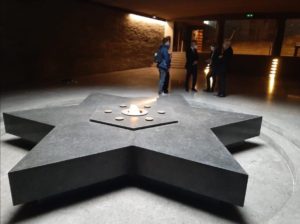 We started on the first of September, 1992. Next year, it will be 30 years since we launched the program. We sent our first Gedenkdiener volunteer to the Auschwitz museum. It started in Auschwitz, at the Yad Vashem Holocaust Museum, and the Frank Foundation in Amsterdam. Two years later, we sent volunteers to the United States Holocaust Memorial Museum in Washington. All of our initial volunteers concentrated on projects to remember the Shoah, the Holocaust.
We started on the first of September, 1992. Next year, it will be 30 years since we launched the program. We sent our first Gedenkdiener volunteer to the Auschwitz museum. It started in Auschwitz, at the Yad Vashem Holocaust Museum, and the Frank Foundation in Amsterdam. Two years later, we sent volunteers to the United States Holocaust Memorial Museum in Washington. All of our initial volunteers concentrated on projects to remember the Shoah, the Holocaust.
The next big step came in 1998, when Michael Prochazka joined me. We founded a new organization together called Austrian Service Abroad, which allowed us to broaden the scope of our work to encompass social work as well as peace projects. And we expanded our service to more countries and regions worldwide, including now in Taiwan, where we plan to send our first volunteers in 2022.
Glenn Leibowitz: Michael, could you tell us more about the Austrian Service Abroad’s expanded range of projects?
Michael Procházka: Besides the Holocaust Memorial Service, we established the Social Service and Peace Service, acknowledging our responsibility for the past, present, and future. We now have a very broad spectrum of Holocaust Memorial Service, Social Service, and Peace Service projects. Within the Social Service, young Austrians provide various services, working as assistant teachers in schools for homeless children, or as volunteers in elderly homes and medical services organizations. Some are building toilets in African countries, as another example. The Peace Service deals with past conflicts and contributes to safeguarding peace agreements.
But the Holocaust Memorial Service is still the main pillar of Austrian Service Abroad. More than 60% of our volunteers are involved with Holocaust-related missions. It’s maybe surprising, but at the same time reassuring that young Austrian men and women want to deal with the past responsibilities of Austria being involved in the Second World War. Interest in the Holocaust Memorial Service is very high, and that’s why we are still looking to see where we can send young people to provide voluntary service.
Glenn Leibowitz: How has the Austrian Service Abroad continued to grow since its founding?
Michael Procházka: Financially speaking, we are much better off than 20 years ago. While our programs were organized by volunteers for many years, we now have professionals running our office. With increased funding from the Austrian Government, many more young Austrians can participate in this program now; and of course, there’s always the potential to grow. We continue to find partner organizations where we can send our volunteers; sometimes two or three young people are sent to volunteer at an organization at the same time.
We have strategies for continued growth. The more people participate, the more understanding we have of the problems of other countries, other cultures, and other people. Such interactions ensure that people continue to talk with each other. This is what will help the world avoid future conflict and wars.
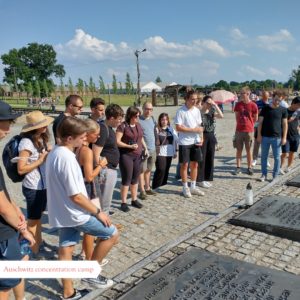
Austrian youth standing at the site of the former Auschwitz Birkenau concentration camp. (Image courtesy Austrian Service Abroad)
This year, despite COVID, we have been doing better than ever before. Even with the pandemic, we have 105 people serving abroad this year, with some getting involved through telework.
It is a success story that we are proud of. But it would be great if it would grow even more. Austria is a small country of 8 million people. Most young Austrians will want to perform their military service, which is fine. They assist with handling natural disasters. We need them. We also have the Red Cross and other organizations that depend on civil servants to complete their alternative service in Austria.
But many young Austrians want to go abroad and experience the kind of encounters that we provide on our program. They want to take responsibility for history and get engaged. People are usually affiliated with us for about three years, but it’s really a lifetime experience. Of course, they will all go on to pursue their careers, but the three years they spend with us really shape their character and personality.
I think we contribute a lot to Austria with our service. The government also appreciates what we do.
Glenn Leibowitz: What kind of impact has Austrian Service Abroad had for your country, and also for the young people who volunteer in your organization?
Andreas Maislinger: Gedenkdienst gave my country, the Republic of Austria, a way to define itself in a different and more responsible way. Austrians can now say ‘Yes, we also feel responsible for what happened between 1938 and 1945. We were not only victims.’
Of course, my father was in a sense a victim because he was an Austrian patriot and Austrian Catholic, and he had to join a foreign army. This is one part of the truth. But the Gedenkdienst gave my country the chance to emphasize other parts of the truth: that many Austrians in very high positions were perpetrators and enablers of the Holocaust. For example, several were commanders of the extermination camps in Poland. Therefore, Gedenkdienst from the beginning has been very important. We’re proud of the fact that politicians and even the Austrian prime minister has mentioned the Gedenkdienst on several occasions.
Daniel Schuster: What we are offering are transformational experiences. The youth that we send abroad are with us for quite an extended period of time. When a person applies to our program and becomes a candidate — who are with us for one and a half years before we send them abroad — they are confronted with a lot of topics that they would not usually be confronted with, nor in such depth. They read a lot of books that they otherwise wouldn’t read, they watch a lot of documentaries that they otherwise wouldn’t watch, and they go to a lot of events that they otherwise wouldn’t go to. They also attend seminars and go on study trips.
For example, this year we took an eight-day Holocaust study trip to Poland and a five-day seminar about Israel, during which our candidates met with a lot of new people. There’s a very strong widening of their social horizons, in addition to a widening of their intellectual horizons, as well as a widening of their emotional horizons. They are confronted with very serious topics that often move them to tears. This is the sort of preparation they undertake before going abroad.
I can tell you from my own experience, it’s incredible. I had just turned 20 when I found myself in Yad Vashem for 12 months, surrounded by Israeli Holocaust survivors, world-class historians, and a community of people who feel such a sense of responsibility towards history.
In my case, it created a chain reaction, a domino effect that’s impossible to describe. I always knew that after I finished my service, I would come back to Israel one day. And I did, even though it took me six years to return.
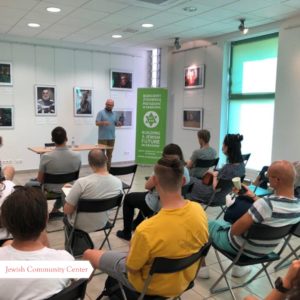 During those six years, I constantly felt intellectually and emotionally connected to Israel. Whenever I read or heard something in the news about that country, I would follow up on it and I would continue to learn about the country. I decided to go to Israel for a master’s degree, and I also worked at an Israeli startup company. Now that I’m back in Austria, I’m still working on topics related to Israel and the Holocaust. Working at Austrian Service Abroad, I’m extending my knowledge and my experiences to other youth who have decided to follow a similar journey.
During those six years, I constantly felt intellectually and emotionally connected to Israel. Whenever I read or heard something in the news about that country, I would follow up on it and I would continue to learn about the country. I decided to go to Israel for a master’s degree, and I also worked at an Israeli startup company. Now that I’m back in Austria, I’m still working on topics related to Israel and the Holocaust. Working at Austrian Service Abroad, I’m extending my knowledge and my experiences to other youth who have decided to follow a similar journey.
It’s really not possible to quantify the impact, but I can tell you that the people who come to us—they are changed forever, and changed for the better. They have unique experiences that people who don’t go through such a program could never have.
For me, Gedenkdienst essentially is about honesty: honesty regarding the past, an assumption of responsibility for something people of my own country did, an act of asking for forgiveness for what happened, an expression of a desire to make things better in the future. And it’s about peace, peace based on honesty and humility.
It is a transformational program that leads youth into the darkest chapters of human history, into the abyss of humanity through intellectual, social, and emotional experiences. It enables them to emerge with a clearer moral compass and a strong desire to contribute good to this world.
For more information about Austrian Service Abroad, visit their website, and follow their Facebook page.
Glenn Leibowitz is CEO of the Jeffrey D. Schwartz & NaTang Jewish Taiwan Cultural Association (JTCA), a non-profit organization dedicated to fostering Jewish culture and education in Taiwan and globally.
Jonah Katz contributed to editing this interview.

